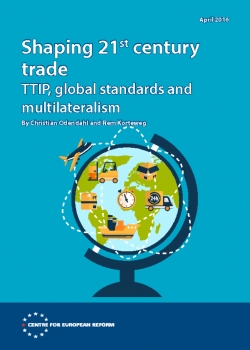
Shaping 21st century trade: TTIP, global standards and multilateralism
- The Transatlantic Trade and Investment Partnership (TTIP) between the EU and the US, currently under negotiation, is a highly complex trade deal that promises to go well beyond the tariff-reducing regional trade agreements of the 20th century. At the centre of TTIP are non-tariff barriers to trade: regulation, standards, market access and investment protection.
- Common regulation and standards would create a bigger and simpler market for producers and consumers, increase competition and lower costs, since producers would no longer need to go through different regulatory procedures on each side of the Atlantic. This is especially important for global value chains – production networks that stretch across many firms and countries – which dominate 21st century international trade. Trade in parts and components (intermediate goods) makes up 50 per cent of globally traded goods. The share is even higher for intermediate services, and trade within firms already accounts for half of all commerce between the EU and the US.
- The idea of regulatory co-operation between the EU and the US is nothing new, but TTIP aims to intensify such co-operation, without compromising the rights of both regions to regulate for health, safety or environmental reasons. Contrary to a common perception, especially in Europe, the US does not generally have lower regulatory standards. The regions are natural partners with similar demands and preferences for health and safety, as well as environmental and labour standards. TTIP would set new international norms that third countries would have a strong incentive to follow.
- TTIP also covers investment protection. Economically, such protection is probably not necessary, as both regions have sophisticated legal systems and large existing flows of investment. But worldwide, there are roughly 3,000 bilateral investment treaties in existence which contain some form of investment protection and arbitration, not always to the benefit of the signing parties. An improved investment agreement between the US and the EU, therefore, would help set a new, better worldwide benchmark.
- TTIP will also have an impact on multilateral trade, where current negotiations are stuck in the never-ending 'Doha round'. Not all aspects of regulation and standards are suitable for full multilateralisation, as countries at different levels of development have different preferences. But in those areas, in which common global rules and standards should be the goal, TTIP could provide the benchmark that other countries can adopt. It is thus important that TTIP is kept open to third countries, especially in Europe’s neighbourhood. These countries should be consulted on regulatory initiatives and given market access once they adopt TTIP standards.
Copyright is held by the Centre for European Reform. You may not copy, reproduce, republish or circulate in any way the content from this publication except for your own personal and non-commercial use. Any other use requires the prior written permission of the Centre for European Reform.

